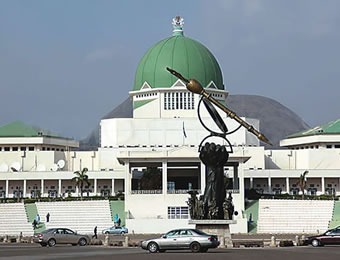Authorities of the National Assembly on Tuesday urged Nigerians and all lovers of democracy to protect the legislature as the symbol of democracy all over the world.
The Clerk for the National Assembly (CNA), Architect Amos Ojo gave the charge in Abuja, during the opening ceremony of a 3-Day Training Workshop for Staff of the House of Representatives, themed: ‘Legislative work ethics and behavioural conduct at work place’.
“Training and development of employees assist both the organisation and employees in attaining diverse goals, such as improving morale, sense of security, employee engagement and overall competencies.
“The Legislature is the first among the three Arms of Government – the Legislature, Executive, and the Judiciary. These Arms are characterised by the principle of separation of power as each is supposed to be independent of the other. The Legislature derives its powers from the 1999 Constitution (as amended) in Sections 4(1) and 4(2). The Legislature is vested with the powers to make laws for the peace, order and good governance of the Federation.
“It is also vested with investigatory powers, financial powers, confirmation and impeachment powers.
“It would not be out of place for me to use this occasion to remind us that the Legislature is the symbol of Democracy all over the world. It is therefore pertinent and incumbent on all lovers of Democracy to ensure that this Institution is protected.
“One of the ways of doing this is adequate training of Staff. As I said at one of the training programmes organised for Staff, we cannot continue to do things in the same way and expect to achieve different results.
“Although it is the Legislators that have the monopoly of presenting Bills during plenary, most of you play critical supportive roles in ensuring the enactment of quality Bills. These could be in the conduct of research, drafting, scrutinising Bills, while some of you are responsible for cleaning up the Bills and Authentication of Bills by me, before forwarding them for Presidential assent.
“Your roles in the law-making process are therefore critical to the sustenance of Democracy in Nigeria and well recognised by Management. We must continue to add value to the legislative process and should not underestimate the importance of the services we render to our dear nation as we facilitate quality lawmaking that would promote public order and security,” he stressed.
On his part, Clerk of the House of Representatives, Dr Yahaya Danzaria observed that previous National Assembly management teams since 2010, had presented staff with a Code of Ethics through workshop Training or booklets form, intended to guide our work ethics and behavioural conduct in a public place.
“The essence was to bring about forthrightness in the conduct of the National Assembly staff and to ensure optimum service output and serve as a means of enlightenment and constant reminder of staff oath of office as civil servants.”
According to him, “At policy level, the values of administrators, policymakers etc are known to inform the kind of policies they initiate or support including the way they go about realizing them. These two factors as we are aware are contained in the civil service rules which embody full moral principles to guide the civil servants in the discharge of their duties.
“The inability of the civil servants to keep to these rules is ‘serious misconduct’ as in Section 04401 of the civil service rules. Serious misconduct is a specific act of serious wrongdoing and improper behaviour which can be investigated and proved. It includes absence from duty without leave, disobedience, refusal to accept posting, corruption, dishonesty, drunkenness, insubordination, falsification of records, negligence etc.
“Ethnicity is the use of ethnic and sectional sentiment to confer unmerited and undue advantage to people of same ethnic origin. This happens in many ways including a situation where a particular part or ethnic group attempts to dominate leadership of some government institutions because of the number of officers from such region. The leadership of such institutions is treated as exclusive preserve of the dominating region.
“The implication is that if you are a leader and not from that part of the region, you intend to lose the loyalty of the officers from that region. It is no mistake that Section 14(3) of the 1999 Constitution of the Federal Republic of Nigeria stated that: ‘the composition of the government of the Federation or any of its agencies and the conduct of its affairs shall be carried out in such a manner as to reflect the federal character of Nigeria and the need to promote national unity and also to command a national loyalty, thereby ensuring that there shall be no predominance of persons from a few state or from a few ethnic or other sectional groups in that government or any of its agencies.”
“In giving effect to section 14(3) of the Constitution, the Constitution in Part 1 of the Third Schedule provided for the establishment of a federal character Commission.”
On the policy prohibiting leaking of Official Secret, he observed that: “civil service considers as very important, the need to maintain secrecy on official government documents. The Oath of Secrecy of 1962 has remained in force in the civil service to demonstrate the premium government places on official documents. An official who divulges official secrets in the civil service is said to have divided loyalty.
“This three-day workshop is intended to bring staff to speed on their ethical and behavioural responsibilities and guide them to their legislative processes.
It is a programme designed to provide you with another opportunity to refresh your understanding and knowledge of the legislative practices and procedure; equip you with new skills of bill processing in the era of technology; your role in legislative support service among others.”
According to him, the ultimate purpose of the workshop was to ensure that the Staff of the House of Representatives are the best in the National Assembly when it comes to work ethics, behavioural conduct and performance of official duties. We must have a House that meets best International Parliamentary practices in legislative and administrative issues.”
ALSO READ FROM NIGERIAN TRIBUNE
- ‘39.6 percent of unmarried university students use sexual performance-enhancing drugs’
- Tips on building a happy and healthy relationship
- Safety precautions to observe at the airport
- Safety tips to observe when boarding a ride from a ride-hailing app
- Secure your social media accounts from hackers with these tips
- Things to look out for before starting a business
- Striking a balance between your 9-5 job and your side hustle
- Little or no work experience? Here’s what you can do
- Top 10 Business Ideas In Nigeria You Can Start With 100,000 Naira
- NASS Nigerians democracy legislature
- NASS clerk urges Nigerians, lovers of democracy to protect legislature
WATCH TOP VIDEOS FROM NIGERIAN TRIBUNE TV
- Relationship Hangout: Public vs Private Proposals – Which Truly Wins in Love?
- “No” Is a Complete Sentence: Why You Should Stop Feeling Guilty
- Relationship Hangout: Friendship Talk 2025 – How to Be a Good Friend & Big Questions on Friendship
- Police Overpower Armed Robbers in Ibadan After Fierce Struggle






